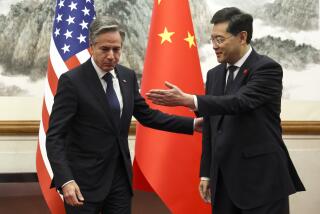China’s Rising Star a Defender of Status Quo
- Share via
BEIJING — When the deadliest earthquake of the 20th Century struck the city of Tangshan in 1976, the Chinese regime headed by Mao Tse-tung hurriedly dispatched a bespectacled mid-level bureaucrat to the scene.
He was Li Peng, then deputy director of the Beijing Electric Power Administration. His mission: to repair power transmission lines and a substation in Tangshan so that electricity could be restored to the Kailuan coal mines that are vital to the Chinese economy.
According to official propaganda, Li was personally responsible for getting the mines running again.
Whether this account is exaggerated or not, it tells something about the background and responsibilities of a rising star of Chinese politics--the 58-year-old vice premier who many analysts believe is being groomed to take over later this year as China’s premier.
Li is China’s apostle of the status quo. More than anyone else among this country’s younger generation of leaders, he is a product of the existing order--the Communist Party regulars, the government ministries, the energy bureaucracy and the state planning apparatus, which together have governed China since 1949.
His round face and fastidious manner convey the message that the Communist Party has not been doing so badly; there is no urgent need to change the fundamental system under which the nation has been governed for nearly four decades.
Many others among China’s current crop of leaders rose through the ranks because they were proponents of economic reform. Virtually all of them had lost their jobs or suffered in one way or another during the 1966-76 Cultural Revolution.
But not Li. After he finished training as an engineer in Moscow in 1954, he spent an uninterrupted three decades as a government official specializing in power and energy resources. Over the years, his wife and three children have also landed jobs in China’s power industry.
The vicissitudes of high-level power struggles have not seriously affected Li’s career. Through all of China’s campaigns and counter-campaigns, through both the Cultural Revolution and the era of reform, Li continued to rise steadily through the ranks of government ministries and up into the senior leadership.
The key factor in his unbroken political ascent has been high-level patronage. During wartime in the 1940s, Li was raised in the Communists’ headquarters of Yanan by none other than revolutionary leader Chou En-lai and his wife, Deng Yingchao.
If anybody can be considered truly a son of the Communist Party and an heir to its traditions, it is Li.
His father was Li Shuoxun of Sichuan province, one of the earliest members of the Communist Party, a close associate of Chou and one of the leaders of the Communists’ famous Nanchang uprising of 1927.
Li was born in the city of Chengdu in 1928. Three years later, the Kuomintang (Nationalist Party) executed his father on the island of Hainan.
The young boy lived with relatives in Chengdu until 1939, when Chou and his wife discovered where he was. They had Li brought to Yanan and in effect raised him as their child. Li called Chou “uncle” and Deng Yingchao “mama.”
(Chou died in 1976, but Deng Yingchao still lives. Although her health is frail, she continues to wield some influence at the top ranks of the party.)
As a teen-ager in the early 1940s, Li studied at an institute of natural science set up by the party in Yanan, the party’s first technical training school. He joined the Communist Party in 1945, when he was 17.
That year, he visited Chou in his cave at Yanan. According to Li’s account, Chou told him to remember that it is one thing to become a member of the Communist Party organization and something else, far more important, to become a party member in ideological terms.
Li never became closely involved in the fighting of the Chinese civil war. Instead, he served in economic construction in Manchuria, working as the teen-age Communist Party secretary of the Harbin Oils & Fats Corp.
From 1948 to 1954, he went to Moscow to study hydropower engineering. While there, he was the head of the Assn. of Chinese Students in the Soviet Union.
Upon his return to China, he began working in northeast China, first as an engineer and then as power plant director. In 1966, the year that the Cultural Revolution broke out, he was brought to Beijing to help run the city’s power supply bureau.
Li eventually rose to become the nation’s minister of electric power in 1981 and a vice premier in 1983. Two years ago, he also was named the minister in charge of the State Education Commission, a job that makes him the government official directly responsible for running China’s schools and universities.
Because of his ability to speak Russian and his prolonged stay in Moscow, Li has played a leading role in the renewal of high-level contacts with the Soviet Union.
Two years ago, the Chinese leadership selected him as its emissary to Moscow for the funeral of former Soviet leader Konstantin U. Chernenko.
Of the younger group of Chinese officials, Li has been among the ones most careful to avoid public identification with the West.
When the annual session of the National People’s Congress, China’s Parliament, opened last month, some of China’s reform-minded leaders, including Premier Zhao Ziyang, former party secretary Hu Yaobang and secretariat member Hu Qili, wore Western business suits.
Li, however, avoided Western dress. Like most of the older, more conservative generation of leaders, he wore a high-necked Mao suit, emphasizing his conformity with Chinese traditions.
More to Read
Sign up for Essential California
The most important California stories and recommendations in your inbox every morning.
You may occasionally receive promotional content from the Los Angeles Times.









